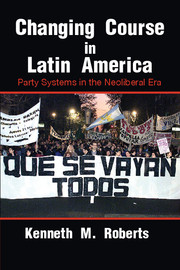Book contents
- Frontmatter
- Dedication
- Epigraph
- Contents
- List of Figures
- List of Tables
- Preface and Acknowledgments
- List of Abbreviations
- 1 Introduction: Party System Change in the Neoliberal Era
- Part I Explaining Regional Patterns
- Part II National Experiencesin Comparative Perspective
- 7 Critical Junctures in Elitist Party Systems
- 8 Critical Junctures in Labor-Mobilizing Party Systems
- 9 Aftermath: Reactive Sequences and Institutional Legacies
- 10 Conclusion: Political Legacies and the Crisis of Representation
- Appendix Election Results in Latin America
- References
- Index
7 - Critical Junctures in Elitist Party Systems
Published online by Cambridge University Press: 18 December 2014
- Frontmatter
- Dedication
- Epigraph
- Contents
- List of Figures
- List of Tables
- Preface and Acknowledgments
- List of Abbreviations
- 1 Introduction: Party System Change in the Neoliberal Era
- Part I Explaining Regional Patterns
- Part II National Experiencesin Comparative Perspective
- 7 Critical Junctures in Elitist Party Systems
- 8 Critical Junctures in Labor-Mobilizing Party Systems
- 9 Aftermath: Reactive Sequences and Institutional Legacies
- 10 Conclusion: Political Legacies and the Crisis of Representation
- Appendix Election Results in Latin America
- References
- Index
Summary
To understand variation in the stability of party systems during and after neoliberal critical junctures, it is essential to know how different party systems managed the transition from ISI to neoliberalism, and how they were transformed by that process. As Chapter 5 demonstrated, elitist party systems, on average, faced less-disruptive political and economic challenges during this period of transition and were less electorally volatile than their LM counterparts. As a theoretical first-cut, this generalization suggests that antecedent patterns of political and institutional development during the ISI era accounted for a significant portion of the variation in party system stability during the critical juncture. This generalization, however, masks significant variation in the stability of national party systems within each of the two categories, and it glosses over quite distinct patterns of change and continuity. It cannot explain why some parties thrived and others floundered in the same party system, or what adaptive strategies were more or less successful under certain conditions. Neither does it tell us whether electoral volatility reflected vote shifts among established parties or the rise of extra-systemic challengers. Most important, it does not identify the more contingent political processes and alignments within the critical juncture itself that shaped different outcomes.
Elitist party systems amply demonstrate how neoliberal critical junctures produced divergent political outcomes. Although the transition to market liberalism was less economically traumatic and politically destabilizing, on average, in countries with elitist party systems, they nonetheless experienced widely varying patterns of party system change and continuity during the critical juncture. Some party systems adapted to the new policy landscape with no change in their organizational composition and minimal shifts in their electoral balance of power; Honduras and Costa Rica (in the short term) are the obvious examples. Others, like Uruguay, kept the same organizational composition but experienced electoral realignment, with one party (on the left) growing at the expense of conservative rivals. Still other party systems, like that of Ecuador, were both organizationally and electorally fluid. Although no elitist case experienced party system decomposition during the critical juncture, several did in the aftermath period (i.e., Ecuador and Colombia). And while some elitist party systems were programmatically aligned by the process of market liberalization (namely Uruguay’s), others were de-aligned (such as those in Ecuador and Costa Rica).
- Type
- Chapter
- Information
- Changing Course in Latin AmericaParty Systems in the Neoliberal Era, pp. 137 - 173Publisher: Cambridge University PressPrint publication year: 2015

